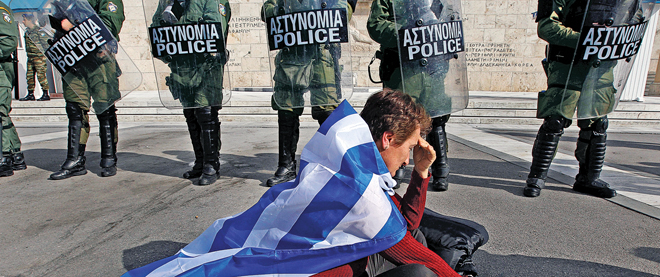Greece: When democracy is denied, people take to the streets
Lucas Papademos quickly expelled members of the government who opposed the austerity package
Yannis Behrakis/Reuters
Share

Ancient Athenians made no distinction between themselves and their government. Official pronouncements attributed decisions to “the citizens of Athens” and left it at that. Such an inclusive sense of democracy is sadly absent in the modern city.
This week in Athens tens of thousands of protesters, angered by severe new austerity measures proposed by the unelected caretaker government of Prime Minister Lucas Papademos, set fire to scores of buildings and rampaged throughout town. They were met by riot police lobbing tear gas and stun grenades. And after the package passed, Papademos quickly expelled members of his government who voted against it. This is apparently no time for dissent or debate.
The turmoil in Greece is well earned. Many decades of lavish but unsupportable welfare state spending have left Greece impossibly burdened; its sovereign debt stands at 160 per cent of GDP. And yet the new austerity package could accelerate the already precipitous fall in living standards. The economy shrank by seven per cent last year and unemployment among the volatile 16-24 age group is 46 per cent.
Greece thus faces two stark choices. If it wishes further bailouts and to continue using the euro, it must carry on with the harsh measures demanded by other European countries (notably Germany—see “Achtung, baby!” page 36) and private sector lenders. This option may offer the greatest chance for stability, both in Greece and the rest of Europe.
Alternatively, Greece could decide it values its own sovereignty more than solidarity with neighbours. A default (which many consider inevitable regardless of further bailouts) and expulsion from the euro would likely lead to severe inflation, bank failures and an even more rapid decline in living standards over the short term. Over a longer period, however, it holds the possibility of a real recovery. Heavily indebted countries such as Mexico and Russia have defaulted, devalued and gone on to enjoy substantial growth.
So a difficult choice is in the offing. But who should choose? The basic precept of democracy is that the people must have the final word. And yet this imperative appears to have been forgotten throughout the euro crisis.
In November 2011, the previous—elected—prime minister of Greece, George Papandreou, proposed to hold a referendum on an earlier bailout agreement. It seemed a reasonable idea, given a properly worded question. Yet outrage from foreign leaders and financiers, aghast at what would happen if the country said no, forced Papandreou to retract his proposal. Days later he was gone as prime minister and in his place stood the unelected Papademos, former vice-president of the European Central Bank.
Rule by technocrat without coherent public input is becoming the preferred means of governing among Europe’s sick men. In Italy, former European commissioner Mario Monti, unelected as prime minister, is also running the show. While technocracies of this sort would have appealed to ancient Greek philosopher Plato—he considered government too important to be left to the masses and envisioned rule by an elite cadre of guardians raised from birth to lead—it is at direct odds with that other Greek innovation of democracy.
It is difficult to imagine a greater gap between what a government proposes and what the public wants than what is on display in Greece today. And when people find their ability to express themselves denied at the ballot box, they take to the streets, just as they have done in Athens, and look for others to blame.
From a distance, Canadians may consider that imposing strict austerity measures on Greece is the necessary thing to do, and an appropriate sanction for all those years of neglectful profligacy. But this is a choice the Greeks must make for themselves. A proper referendum on the way ahead, as former prime minister Papandreou once proposed, seems the only permanent solution to the Greek dilemma. Remember, there are no wrong answers in a democracy.
Trent Frayne, one of Canada’s greatest sports writers and a long-time Maclean’s writer, passed away last week at age 93. His first article for these pages appeared in 1941 (a profile of Toronto Maple Leafs goalie Turk Broda) and over the decades he held forth on sports and sports figures of every description. A master wordsmith, Frayne was particularly admired by colleagues and readers for opening lines that made it impossible not to read the story that followed. A few of our favourite Maclean’s ledes: “There was a time when college football was an excuse to drink outdoors without being arrested” (Dec. 4, 1989); “There’s nothing wrong with the Olympic Games that taking them to the Sahara Desert wouldn’t cure” (June 4, 1990); “Golf has its interesting moments, but is it really a sport?” (Aug. 7, 1995); and “In the days before he started stealing their money, hockey players sometimes called Alan Eagleson ‘Super Al.’ ” (June 19, 1998). His talent and wit enlivened every sport, for all Canadians.